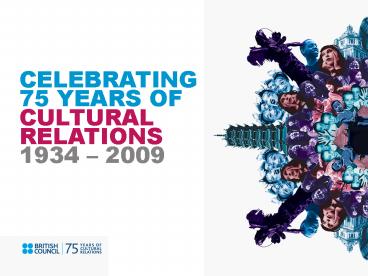CELEBRATING - PowerPoint PPT Presentation
1 / 16
Title:
CELEBRATING
Description:
... religion, morals, stereotypes, language, dialects, family structures, rituals ... Poems. Songs. Films. Diversity and Drama. Objects unique to a society ... – PowerPoint PPT presentation
Number of Views:39
Avg rating:3.0/5.0
Title: CELEBRATING
1
CELEBRATING 75 YEARS OF CULTURAL RELATIONS 1934
2009
2
Addressing Diversity Through Drama in ELT Henry
Robinson MA, MBA LCTL Dip TESOL
3
Addressing Diversity Through Drama in ELT
- Content
- Discuss Diversity in ELT and addressing it.
- Experience a Drama and Diversity activity
- Identify advantages of addressing Diversity with
Drama - Developing own Drama and Diversity activities
4
The Modern Stage Global English
- Interest in a wide range of subjects / issues
- Linguistic to communicative competence
- Shift from form to content
5
What is Diversity?
- Differences in Ideas, belief, attitudes,
behaviour - Customs, values, laws, politics, religion,
morals, stereotypes, language, dialects, family
structures, rituals
- .Material productions
- Technology, art, literature, artifacts, food,
architecture,
6
What Can Be Dramatised?
Own stories Biographies Creative
textsPoemsSongsFilms
- A piece of creative thought of artistic value
expressed by actors
7
Diversity and Drama
- Objects unique to a society
- Proverbs, idioms
- Social structures, roles, relationships
- Customs, rituals, traditions, festivals
- Beliefs, values, superstitions, taboos
- Political, historical, economic background
- Institutions
- Metaphorical meanings
- Humour
- Genre
- Status
8
Drama in the ELT For and Against
- Motivation (McKay 2000)
- Authentic cultural experience
- Exposure to real language
- Ability to relate to real needs
- Can support a creative approach to teaching /
learning - Widening perspectives (Stuart and Nocon 96)
- Mono-culturalism
- Stereotyping
- Difficult language level
- Idioms, deviant forms
- Culturally difficult
9
Enhancing Diversity Awareness
- Culture is always in the backgroundchallenging
the good language learners ability to make sense
of the world around them
Kramsch, 1993 1
10
Culture in the EFL Classroom
- ..Learning about the(target) as well as about
ones own culture requires tools that assist
language learners in understanding the cultural
texts in which (languages) are used..
Stuart and Nocon, 1996 432
11
Drama and the Human Brain
- ..Language teaching is still operating on a
relatively narrow conception of language and
culture..As a fixed system of formal
structures.A neutral conduit for cultural
knowledge..
Kramsch 1996
..the synchronicity between brain based learning
and ....learning through drama is clear and
evident... Norman, 1999
12
Introducing Drama in ELT
- Set clear aims / objectives
- Begin with L experience
- Activity to have a clear purpose (selling points
Cullen, Sato 2000) - Cross-cultural approaches
- Appropriate level
- Learners interests / habits
13
Levels of Achievement / Ability
- Identifying
- The content, story, plot, characters
- The authors viewpoint, attitude or opinion
- The work in its historical/ cultural context
- And
- Responding
- Answering the question does it work as
literature?
14
Diversity Awareness Skills
- Observing, identifying
- Comparing / contrasting
- Negotiating meaning
- Dealing with / tolerating ambiguity
- Interpreting messages
- Limiting misinterpretation
- Defending a point of view / understanding
another's viewpoint - Accepting difference
Rose, 2002
15
The Third Space
- Shifting, changing cultures
- Cross cultural competence
- Learners as heteroglossic narrators
- Fixed stable culture
- Linguistic competence
- Learners as monoglossic receivers
16
Contact Details
- henry_robinson_at_hotmail.com































